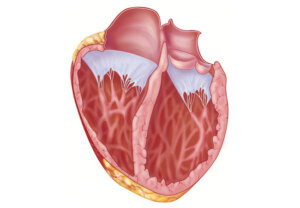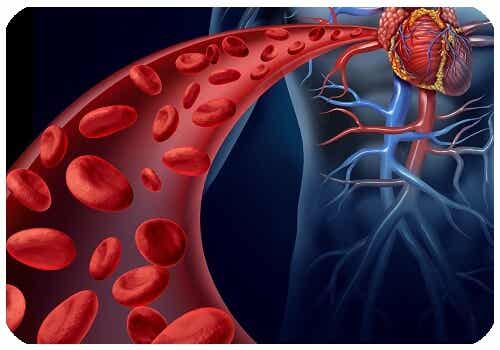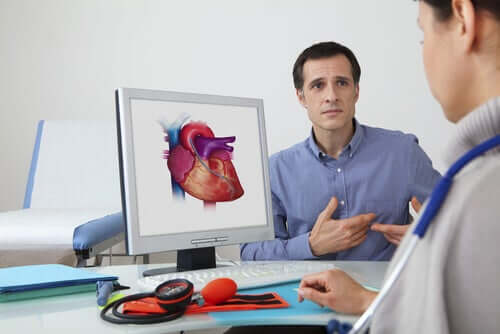What you Should Know about a Dilated Heart


Written and verified by the doctor Elisa Martin Cano
A dilated heart is also known as dilated cardiomyopathy. It’s a heart disease that causes the heart to function incorrectly.
It has various causes and symptoms. In addition, there are some factors that can influence this disease’s development that you should know. Next, we’ll share everything you need to know about a dilated heart.
How does the heart work?
First, we’re going to clarify some important concepts about a healthy heart so that we can better understand this disease. The heart is divided into four chambers:
- Two atria in the upper part
- Two ventricles in the lower part
To understand how it works, we’ll separate the heart into the left half and the right half:
- The right atrium receives oxygen-depleted blood that comes from all over the body. From there, it passes it on to the right ventricle which then expels it to the lungs. In these organs, carbon dioxide is removed from the blood. Then, the blood recharges itself with oxygen.
- Oxygenated blood reaches the left atrium directly from the lungs. From there, it passes to the left ventricle. Then, with each beat, the heart sends the oxygen-charged blood to the rest of the body so that the organs can use the oxygen.
In order for the heart to function properly, the walls of this organ contain the myocardium, which is a muscle. It has to be in good condition to be able to stretch when it receives blood. Also, it needs to be able to contract with enough force to pump blood throughout the body.

Keep reading: How Oral Infections Can Affect the Heart
What is a dilated heart?
A dilated heart is a condition in which the muscular walls of the heart get thinner and start to dilate. It normally begins by affecting the left ventricle, which is the most important chamber for blood supply to the rest of the body.
Then, as the muscle dilates, the force of contraction decreases. As a result, the heart loses strength when pumping the blood and the ventricle expels it more weakly. Therefore, the blood may have trouble reaching your entire body.
What causes a dilated heart?
About half the time, doctors cannot locate the cause of a dilated heart. However, there are certain factors that can influence the development of this condition:
- Genetic cause: In up to a quarter of cases of dilated cardiomyopathy, there is a family history of the disease. In addition, specialists know some of the genetic mutations that can cause it.
- Alcohol abuse: This is also called enolic cardiomyopathy. Consuming an excessive amount of alcohol over many years can cause the heart to dilate.
- Pregnancy: This disease can develop during pregnancy, especially in women with other risk factors like obesity or advanced age. The prognosis and recovery will depend on many variables, but professionals advise against these women having more pregnancies.
- Some viral diseases: Viruses like HIV or coxsackie virus can cause viral cardiomyopathy. Often, the affected person won’t even notice it, which could end up causing a dilated heart.
- Drugs or other toxic substances: For example, some chemotherapy treatments for cancer can produce this condition. Therefore, you need to make sure it’s under control.
Also read: How Oral Infections Can Affect the Heart
Symptoms

There are many symptoms this disease can produce. In general, they’re the symptoms associated with heart disease. Often, they will develop and worsen little by little.
Here are some of them:
- Feeling of suffocation when breathing: This happens because your heart isn’t able to pump blood correctly. As a result, it accumulates in the upper part of the cardiovascular circuit, which is where the lungs are. Therefore, your lung cannot exchange gases correctly which will make you feel like you’re suffocating.
- Tiredness: You’ll first notice that it takes you more effort to do the same things you used to do. Then, it will get worse as the disease progresses until you’ll start to feel fatigued after simple activities, like climbing the stairs or walking. This happens because your body’s muscles don’t get enough oxygen because they can’t pump the blood correctly.
- Palpitations and dizziness: Palpitations are the feeling that your heart is racing inside your chest. Each of these symptoms is due to the heart not being able to meet your body’s needs for oxygen and energy. Therefore, it will accelerate and work beyond its possibilities. And, in more severe cases, it can give out.
Diagnosis and treatment
In order to diagnose a dilated heart, the doctor will need to do a clinical and physical examination. They may also need to perform other tests as well. With these tests, they’ll be able to look at the left ventricle to see if it’s larger than normal. In addition, they’ll be able to check how the heart is working.
Here are some of the tests they may perform:
- Cardiac ultrasound, with or without function tests.
- Chest x-ray
- Electrocardiogram
Once the doctor has confirmed the diagnosis, they will base your treatment on different factors. First, they need to take into account the cause of this condition. For example, if the cause is alcohol, they’ll advise you to give it up so the heart can return to its original shape.
In addition, the specialist will prescribe a series of medications to help your heart pump more efficiently. In very serious cases, you may need a heart transplant.
Conclusion
The heart is the most important organ for the functioning of our entire body. Therefore, we should know which signs to look out for that will let us know something is wrong. If something seems off, you have to go to a specialist so they can diagnose the condition and establish the most appropriate treatment.
Also, it’s best to know the risk factors that can cause this disease so you can control them as much as possible. If you have any questions, be sure to talk to your doctor. They’ll tell you what you need to know in detail.
All cited sources were thoroughly reviewed by our team to ensure their quality, reliability, currency, and validity. The bibliography of this article was considered reliable and of academic or scientific accuracy.
- Miocardiopatía dilatada: avances recientes y tratamiento actual | Revista Española de Cardiología [Internet]. [cited 2020 May 17]. Available from: https://www.revespcardiol.org/es-miocardiopatia-dilatada-avances-recientes-tratamiento-articulo-10736
- García Acuña JM, López Lago AM, González Juanatey JR. Miocardiopatías. Clasificación. Med. 2013 Oct;11(42):2495–9.
- Miocardiopatía dilatada – ScienceDirect [Internet]. [cited 2020 May 17]. Available from: https://www.sciencedirect.com/science/article/pii/S0304541213706541
This text is provided for informational purposes only and does not replace consultation with a professional. If in doubt, consult your specialist.








